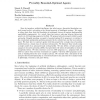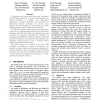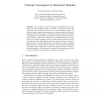1047 search results - page 86 / 210 » Learning the required number of agents for complex tasks |
AAAI
2010
13 years 9 months ago
2010
We consider optimizing the coalition structure in Coalitional Skill Games (CSGs), a succinct representation of coalitional games (Bachrach and Rosenschein 2008). In CSGs, the valu...
IJCAI
1993
13 years 9 months ago
1993
Since its inception, arti cial intelligence has relied upon a theoretical foundation centred around perfect rationality as the desired property of intelligent systems. We argue, a...
ATAL
2004
Springer
14 years 1 months ago
2004
Springer
To anticipate and prevent acts of terrorism, Indications and Warnings analysts try to connect clues gleaned from massive quantities of complex data. Multi-agent approaches to supp...
DIS
2010
Springer
13 years 5 months ago
2010
Springer
How to achieve shared meaning is a significant issue when more than one intelligent agent is involved in the same domain. We define the task of concept convergence, by which intell...
CORR
2011
Springer
13 years 2 months ago
2011
Springer
Modeling the behavior of imperfect agents from a small number of observations is a difficult, but important task. In the singleagent decision-theoretic setting, inverse optimal co...



